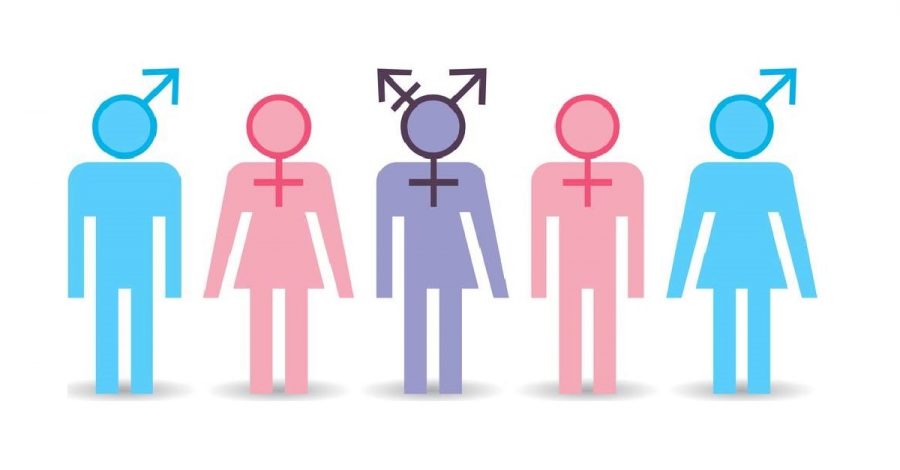Transgender vs. Christian: Middle Ground?
Interviews on the topic of transgenderism from two different points of view
December 17, 2018
As I’ve formed relationships with and tried to understand some transgender people, I’ve become aware of how their being transgender affects their daily lives, relationships with friends and family members, and mental health. I wanted to bring attention to their struggles so that other people, by listening to them directly, can have more sympathy and gain a better understanding of transgender people.
Thus I’ve conducted an interview with an MTF (male to female) transgender woman who wishes to share her life and ideas with others willing to listen. She did not agree to a video/voice interview, however, so we held an interview over e-mail. I also interviewed a young Christian man to hear his thoughts on the topic.
Through these personal interviews, I’ve discovered that Christianity and transgender issues aren’t necessarily pinned against one another, and people with traditionally Christian morals, despite their view of the morality of the topic, can treat trans people with as much respect as anyone else.
Transgender Interview
Unfortunately, I was unable to convince her to be in a video/voice interview; however, I think that even through text her sentiments are quite clear.
Q: At what point did you know you were transgender?
A: I think I started to realize I was transgender around 2016 when I was sixteen. I didn’t really want to be trans, though, so I just denied it for a while. But eventually, I became depressed and suicidal and was forced to come out to my parents.
Q: How would you describe yourself when you look in the mirror?
A: Initially, I didn’t really care when I saw myself in the mirror. Eventually, I realized it was because I didn’t think it was me that I saw. When I started trying to look like a girl, I just started noticing all the flaws that prevent me from being seen as a girl both by myself and by others. I don’t like looking in mirrors much anymore because it makes me depressed, but sometimes when I look cute and feel like a girl, I like looking in the mirror.
Q: How does being transgender affect your daily life?
A: I become very depressed spontaneously all the time, which takes the joy out of most of what I do. People stare at me, and when I’m off my college campus I feel threatened. I can’t participate in a lot of things like dancing or acting because they involve my body and image a lot. I can’t drink alcohol because my medications take a large toll on my liver already. A lot of people discriminate against me, though it’s small things like choosing not to hang out with me or excluding me from a group in public when ordinarily they wouldn’t.
Q: Are you religious? What have the responses from religious people been to you?
A: I’m not religious. My parents are Christian, but it hasn’t really mattered. My grandparents and a lot of relatives are classically Christian, but they haven’t been mean about it. They just avoid talking about it, which I’m fine with. I don’t think most people care in the first place. I’m friends with Christians, atheists, Muslims, Jews, and one of my best friends right now is Mormon. I think it’s more about generation and geographic location than religion.
Q: Do people around you use your preferred pronouns? How does that affect you?
A: Most people use my preferred pronouns. My parents and siblings mess up sometimes, but it’s because they knew me as a boy, so I cut them a little slack. Although people usually use my pronouns correctly, only a few people haven’t slipped up ever. It feels very good and validating when people say they see me 100% like a girl, and when people I’m friends with accidentally say “he,” it’s offputting.
Q: How does being transgender affect your outlook on life?
A: I think what most people don’t understand is that being trans is something you’re born with. Transitioning is the only known effective treatment, and if you don’t transition, you’ll likely just commit suicide, so it’s a life or death situation. I’m satisfied with everything in my life except for the fact that I’m trans, and I wish I weren’t. It’s the worst part of my life by far and influences a lot of aspects of it. For example, I really like learning languages, but I’ve had to give up learning languages like Arabic and Russian because I could be in serious danger if I were to go to those countries.
Q: What else do you want the world to know/understand about transgender people?
A: Being trans simply means that the gender of your brain and the sex of your body are different. It’s not a choice—it’s something you’re born with. Trans people have a super high suicide rate, and this is because, on top of having extreme body issue problems, everyone treats you differently. It’s a lose-lose situation like that, which is why suicide seems to be such a viable option for trans people. It does make me feel a lot more comfortable, however, if I hang out with people who gender me correctly and treat me normally.
Christian Interview
Caleb May is a sophomore here at WCHS. He’s a faithful Baptist with an open-minded perspective on transgender issues. In this interview, he responds to basic questions about transgender issues, and through his responses, it can be seen that he believes that respecting and treating people with kindness is paramount to all else.
Through this interview, people may understand that religious people aren’t full of hate or disgust to trans people, but that the two can indeed coexist peacefully, and Caleb definitely responds in a way that supports this statement.

